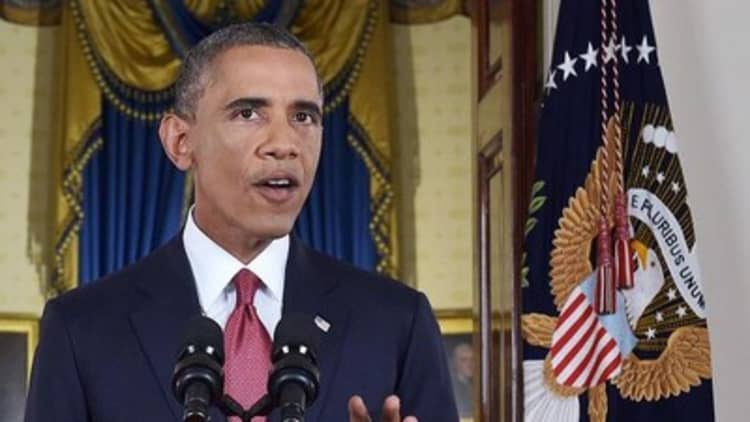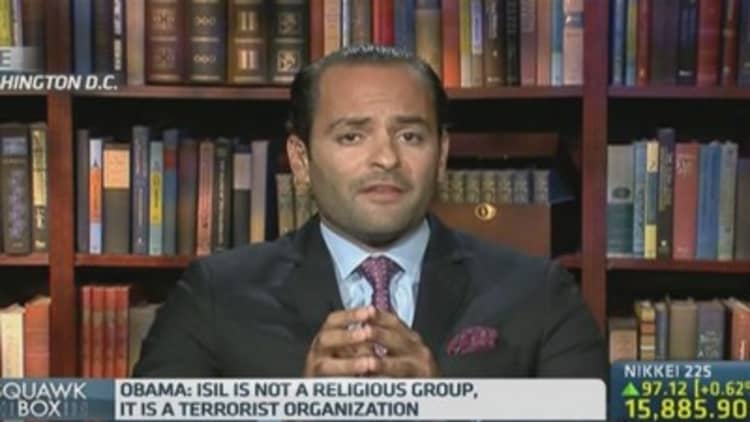
The United States will conduct a campaign against the Islamic State that includes targets in Syria, President Barack Obama said in an address to the nation Wednesday night.
The president had been under pressure from both home and abroad to announce a comprehensive U.S. strategy against the Islamic State (also known as ISIS or ISIL) extremist group.
Less than two weeks earlier he said in a press conference that "we don't have a strategy yet," but he has steadily underscored the need to take the fight to ISIS in recent speeches.
Read MoreGlobal fears give Obama a wild card: NBC-WSJ poll
With Wednesday's announcement, made on the eve of the 13th anniversary of 9/11, the White House is hoping to set the course for further U.S. action in the region, and to settle criticisms about overly ambiguous goals. Obama said the country is meeting the ISIS threat "with strength and resolve."
"Tonight, with a new Iraqi government in place, and following consultations with allies abroad and Congress at home, I can announce that America will lead a broad coalition to roll back this terrorist threat," Obama said. "Our objective is clear: we will degrade, and ultimately destroy, ISIL through a comprehensive and sustained counter-terrorism strategy."

Obama also announced that he has authorized the U.S. military to expand its strikes on ISIS targets.
"Working with the Iraqi government, we will expand our efforts beyond protecting our own people and humanitarian missions, so that we're hitting ISIL targets as Iraqi forces go on offense," he said. "Moreover, I have made it clear that we will hunt down terrorists who threaten our country, wherever they are. That means I will not hesitate to take action against ISIL in Syria, as well as Iraq. This is a core principle of my presidency: If you threaten America, you will find no safe haven."
The president also announced plans to send an additional 475 U.S. service members to Iraq, although he underscored that he will not deploy any troops into combat roles because "we will not get dragged into another ground war in Iraq."
"I want the American people to understand how this effort will be different from the wars in Iraq and Afghanistan. It will not involve American combat troops fighting on foreign soil," he added. "This counter-terrorism campaign will be waged through a steady, relentless effort to take out ISIL wherever they exist using our air power and our support for partner forces on the ground. This strategy of taking out terrorists who threaten us, while supporting partners on the front lines, is one that we have successfully pursued in Yemen and Somalia for years."
U.S. futures had little reaction to Obama's speech, with the Dow indicated down 8 points and the S&P 500 1.75 points lower. U.S. crude futures rose 7 cents to $91.74.
Although the president touted the examples of Yemen and Somalia, Rick Brennan, a senior political scientist at RAND Corp. and a former senior civilian advisor to the U.S. military in Iraq, said these operations should not be held as ideals.
"Unfortunately, U.S. efforts in those two countries have been insufficient to defeat the terrorist organization in those countries. Both of these countries remain terrorist havens," Brennan said in an email after the speech. As for anti-ISIS operations, he added he expects that "eventually the United States will need to employ U.S. special forces to work with surrogate forces in combat operations."
The "steady" efforts in Iraq and Syria, and the battle against ISIS, may well last beyond Obama's tenure as president, experts told CNBC.
"We need to be prepared for a long period of time in this region, and stability is not going to come just with airstrikes," NBC News military analyst Col. Jack Jacobs said after the speech.
Obama also addressed Syria, saying that he has authorized increased assistance to opposition forces there, and calling on Congress "to give us additional authorities and resources to train and equip these fighters."
In these endeavors, the U.S. will be joined by "a broad coalition of partners," Obama said, adding that Secretary of State John Kerry will be traveling across the Middle East and in Europe to enlist more support in the fight.
"This is American leadership at its best," Obama said, "We stand with people who fight for their own freedom; and we rally other nations on behalf of our common security and common humanity."
But this strategy of leadership will rely heavily on those forces the U.S. is able to rally, experts said after the speech.
"America may very well lead a coalition, conduct more airstrikes, and send in more advisers," said Phillip Lohaus, a research fellow at the American Enterprise Institute. "But the Iraqi troops upon which America will be relying for combat and for ground truth have not yet proven that they can reliably perform these functions."

While experts were divided on whether the U.S. should be deploying troops into combat roles, every foreign policy specialist interviewed by CNBC emphasized that Obama should not set limits to American involvement in the region.
"Obama should not say what's not going to be employed," Michael Rubin, a senior lecturer at the Naval Postgraduate School and author of the book "Dancing with the Devil: The Perils of Engaging Rogue Regimes," said earlier Wednesday. "Privately he may want to keep options off the table, but in public he shouldn't say that."
Read MoreIt's decision time now for Obama on ISIS
Not only are publicly announced limits to U.S. engagement strategically undesirable, as they make U.S. actions more predictable, experts said, but they also may cast doubt on Obama's resolve to achieve his goals against ISIS.
"What people want to know is what the man seeks to achieve, and not what the limits are in what he seeks to achieve," said Danielle Pletka, senior vice president for foreign and defense policy studies at the American Enterprise Institute.
American public willingness to use military options against ISIS has increased since the group released videos of the beheadings of two American journalists. While defense experts maintain that there is no known threat posed by the extremists within the United States, officials caution that the group could grow more dangerous.
Read MoreOpinion: Wanted: A US strategy for the Islamic State
"We know ISIL is prepared to kill individual Americans because they are Americans," Jeh Johnson, secretary of the Department of Homeland Security, said Wednesday at the Council on Foreign Relations. "The only responsible thing to do is take them on before they become more dangerous."
"ISIL is vying to be the preeminent terrorist organization on the world stage," he said, noting that it is carrying out 30 to 40 attacks a month and has about 10,000 fighters.
In his Wednesday night address, the president also took a passing shot at Moscow, saying that "it is America that has rallied the world against Russian aggression."
—By CNBC's Everett Rosenfeld. CNBC's Patti Domm contributed reporting.


